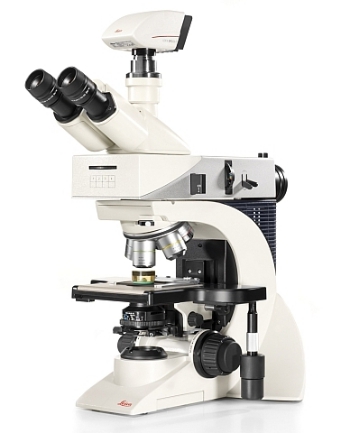The new DM2700 M materials microscope from Leica Microsystems is ideal for all kinds of routine inspection tasks in metallography, earth science, forensic investigation, and materials quality control and research. It offers users state-of-the-art universal white-light LED illumination with high-quality Leica optics.
 Simple and reliable: The Leica DM2700 M materials microscope with universal LED illumination is the ideal tool for a wide range of industrial applications.
Simple and reliable: The Leica DM2700 M materials microscope with universal LED illumination is the ideal tool for a wide range of industrial applications.
The ultra-bright, high-power LED illumination provides users with a constant color temperature of 4500 K for brightfield, darkfield, interference contrast, and polarized light methods. In addition, users can visualize improved surface inspection details with built-in oblique illumination technology. Real color imaging with all brightness intensity levels and lower cost of ownership are realized with the long lifetime and low power consumption of LED illumination technology.
Reliable and simple operation
Reduced risk of error and ease of operation are easily obtained with Leica's intuitive Color Coded Diaphragm Assistant (CCDA). Users are guided through the basic settings of resolution, contrast, and depth of field, ensuring accuracy and repeatability. Greater comfort and productivity are achieved by using the built-in focus stop, the height adjustable focus knobs, as well as the three-gear focusing mechanism. These features provide users of the Leica DM2700 M a convenient and reliable tool for daily use.
The microscope for various applications
The new Leica DM2700 M is a reliable materials microscope for a wide variety of applications: For inspection, process control, and defect analysis of electronic components, the Leica DM2700 M offers high optical resolution to detect even the smallest defects on a sample. The constant color temperature of the LED illumination allows users to always see the sample in the same color. The highly ergonomic design makes the Leica DM2700 M ideal for users in laboratory environments. The ergonomic features help prevent muscular tension or fatigue and make routine work as comfortable and effortless as possible. The microscope’s intuitive operation means it easily adapts to various user levels. The robust stand of the Leica DM2700 M makes it suitable even for challenging working conditions in industrial quality control.